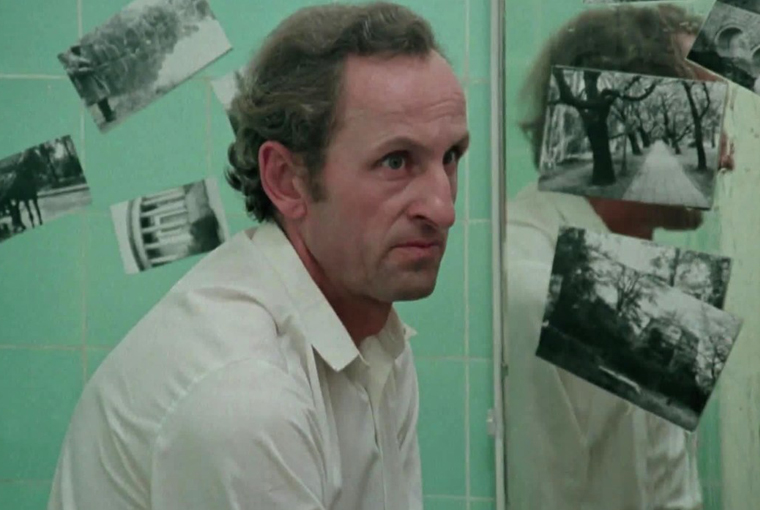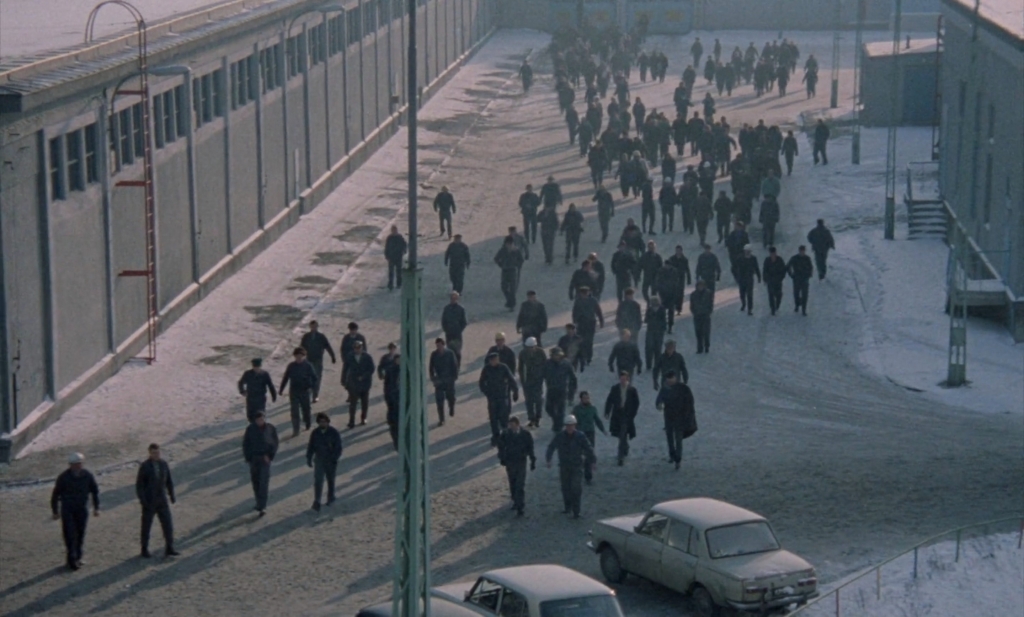Alguns nomes são incontornáveis quando
estudamos a História do Cinema - sim, com letras maiúsculas. Um destes nomes é
difícil de escrever: Krzysztof Kieslowski. Já havia assistido à sua Trilogia
das Cores - “A Liberdade é Azul” é meu favorito dos três –
mas eu não havia tido acesso a
seu trabalho anterior... até agora.
There are some names that you must stumble upon
when studying Film History - yes, with capital letters. One of these names is
hard to spell: Krzysztof Kieslowski. I had already watched his Three Colors
trilogy - being “Blue” my favorite from the trio - but I hadn’t got access to
his earlier work… until now.
Uma nova fábrica vai ser instalada na cidade de
Olecko e Stefan Bednarz (Fransciszek Pieczka) será o chefe. Mas não é sua
primeira vez em Olecko: ele já esteve lá vinte anos antes, quando se envolveu
em um incidente com sua esposa e um homem chamado Stasiu Lech. Ele encontra
Lech novamente, trabalhando na fábrica.
A new factory is going to be installed in the city of Olecko
and Stefan Bednarz (Fransciszek Pieczka) will be the boss. But it’s not his
first time in Olecko: he had been there twenty years earlier, when he got
involved in an incident with his wife and a man named Stasiu Lech. He finds
Lech again, working at the factory.
Em Olecko, sem a esposa, Stefan é visitado pela
filha Eva (Joanna Ozerskkowska), uma jovem adulta de quem ele não é muito
próximo. Para adicionar conflito, muitas pessoas em Olecko são contra a
construção da fábrica, dizendo que as cidades e seus habitantes ficarão muito
melhor sem ela.
In Olecko, without his wife, Stefan is visited by his
daughter Eva (Joanna Ozerszkowska), a young adult with whom he is not very
close. To add to the conflict, many people in Olecko are against the building
of the factory, claiming that the city and its inhabitants are better off
without it.
Este filme é baseado em um livro escrito pelo
próprio Kieslowksi, junto com Romuald Karas. Kieslowski já tinha muita
experiência com documentários em curta-metragem, enquanto Romuald era conhecido
como escritor – na verdade, “A Cicatriz” é o principal crédito de Karas no
cinema.
This movie is based on a novel written by Kieslowski himself,
together with Romuald Karas. Kieslowski had already a lot of experience
in documentary shorts, while Romuald was known as a writer – in fact, “The Scar”
is the main film credit for Karas.
“A Cicatriz” recebeu dois prêmios no Festival
de Cinema Polonês: Melhor Ator e Prêmio Especial do Júri. Tem atualmente 86% de
aprovação dos críticos no Rotten Tomatoes, com 68% de aprovação dos usuários do
mesmo site.
“The Scar” received two awards at the Polish Film Festival: Best Actor and the Special Jury Award. It holds an 86% Fresh rating from critics on Rotten Tomatoes, with a 68% audience score.
Kieslowski uma vez disse que “A Cicatriz” é um
filme de contradição, comprometimento e hipocrisia, e estes podem ser algumas
das várias cicatrizes às quais o título se refere. Outra possível cicatriz pode
ser o conflito entre o pessoal e o profissional sentido pelo protagonista ao
voltar para uma cidade onde ele viveu uma situação desagradável no passado –
algo que, apesar de nunca explicado, certamente deixou nele uma cicatriz.
Kieslowski once said that “The Scar” is a film of contradiction, compromise and hypocrisy, and these can be some of the many of the scars that the title refers to. Another possible scar may be the conflict between personal and professional that the lead feels when he gets back to a town where he lived an unpleasant situation in the past – one that, although never explained, certainly left him “scarred”.
“A Cicatriz” é o filme mais fraco de Kieslowski
que vi até agora – além da Trilogia das Cores, também assisti este ano a “Amador”
(1979). Este também foi o primeiro longa do diretor a estrear nos cinemas. Bem,
nem todos os diretores são como Orson Welles e podem dizer que estrearam com
uma obra-prima.
“The Scar” is the weakest Kieslowski film I’ve seen - besides the Three
Colors trilogy, I also watched this year “Amador” (1979). It’s also his first
feature to receive a theatrical release. Well, not all directors are like Orson
Welles and can claim that they debuted with a masterpiece.


.jpg)


No comments:
Post a Comment